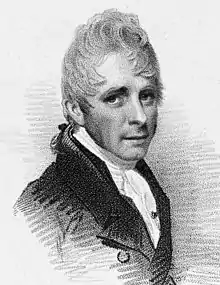Charles Aldis
Sir Charles Aldis (16 March 1776[1] – 28 March 1863) was an English surgeon. His son, Charles James Berridge Aldis, was also a physician.

Aldis was born in Aslacton, Norfolk, the son of Daniel Aldis, a medical practitioner, and Mary Dix.[1] He came to London in 1794 and studied at Guy's and Bartholomew's Hospitals. In 1797 or 1798 he was made surgeon to the sick and wounded prisoners of war at Norman Cross barracks, Huntingdonshire (where from 10,000 to 12,000 French and Dutch prisoners were then detained). In 1800 he moved to Hertford, where he introduced vaccination into three parishes in spite of opposition from the doctors, but in 1802 began to practise in London, and in 1803 became a member of the College of Surgeons. He was surgeon to the New Finsbury Dispensary, and founded a special hospital, called the Glandular Institution for the Cure of Cancer, in Clifford Street. Charles Aldis was known as an antiquary as well as a surgeon, and was knighted by the Lord Lieutenant of Ireland, though whether for any special services does not appear. He died at his London home, 13 Old Burlington Street, on 28 March 1863.[1]
Works
He wrote: "Observations on the Nature and Treatment of Glandular Diseases, especially those denominated Cancer," pp. 116, London, 1820, 8vo, and subsequently; also papers in "Defence of Vaccination," &c.; an "Essay on the too frequent Use of the Trephine;" on the "British System of Education;" and many articles in periodicals.
References
- Payne, J. F.; Wallis, Patrick. "Aldis, Sir Charles (1776–1863), surgeon". Oxford Dictionary of National Biography (online ed.). Oxford University Press. doi:10.1093/ref:odnb/310. Retrieved 25 March 2019.
 This article incorporates text from a publication now in the public domain: "Aldis, Charles (1775?–1863)". Dictionary of National Biography. London: Smith, Elder & Co. 1885–1900.
This article incorporates text from a publication now in the public domain: "Aldis, Charles (1775?–1863)". Dictionary of National Biography. London: Smith, Elder & Co. 1885–1900.